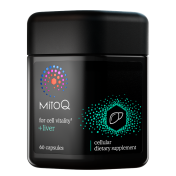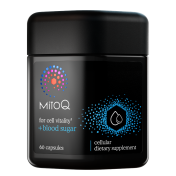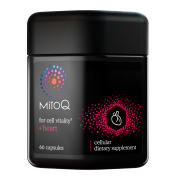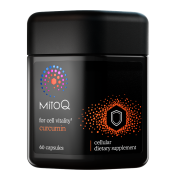Mitochondria
Mitochondria are bean-shaped cell organelles found in nearly all body cells, and they function as the energy factories of our cells. Our body relies on this energy to function properly. The number of mitochondria per cell varies. The more active the cell, the more mitochondria it contains. For energy production in mitochondria, various body parts and substances, including coenzyme Q10, work together in a complex process to produce ATP, or adenosine triphosphate. ATP is often simply referred to as 'energy,' but it is actually a bio-organic compound that plays a key role in cellular metabolism as a carrier of chemical energy. Therefore, ATP is the carrier of fuel for every cell in our body. Nutrition plays a significant role in the healthy function of mitochondria. It is important to obtain an adequate intake of antioxidants such as vitamin C and E, as they help protect healthy cells from oxidative damage.
How do mitochondria produce energy?
The energy production in mitochondria occurs through a process known as cellular respiration, a biochemical reaction that generates ATP within the mitochondria. This involves the biological combustion of small biomolecules, primarily glucose. To achieve this, the food entering the body needs to be broken down into substances that are useful for the body. Sugars, for instance, are enzymatically broken down into the smallest form of sugar, which is glucose. Glucose can then be converted into energy within the mitochondria. This process begins by splitting glucose into even smaller molecules. These molecules undergo oxidation during the citric acid cycle, and then ATP production takes place through the respiratory chain, producing a handy energy package that can be delivered to various parts of the cell where energy is needed. In essence, your mitochondria don't create energy themselves but convert it from one form to another. You can think of this process as the respiration of your cells.
Mitochondria and a Fit Body
The efficiency of your mitochondria significantly affects how fit and healthy your body is. Your heart beats, digestion takes place in your intestines, hormones are produced, you breathe, your body temperature is maintained, your cells regenerate, and your blood is circulated thanks to the energy generated by mitochondria. Besides these basic functions, your mitochondria provide energy for all the activities you engage in, such as exercising, cooking, grocery shopping, singing, and everything else you do each day. Approximately 70% of your energy is needed for your body's basic requirements. As we age, the number of well-functioning mitochondria per cell slowly decreases. This is a natural and normal process. The older you get, the less energy is available in your body. You could say that natural aging and the decline in mitochondrial function are closely related.
Mitochondria, Supplements, and Energy
So, your mitochondria play a vital role in your body's energy levels. In healthy individuals, all mitochondria combined account for about 10% of body weight. For avid athletes, it's even more. This is because muscle cells are packed with these tiny energy factories; each muscle cell contains about 5000 mitochondria, while other cells have 'only' 1000 to 4000. Mitochondria require nutritional molecules to convert into energy, so what you eat significantly impacts mitochondrial function. Healthy fats are essential, especially omega-3 fatty acids. Supplements can also support healthy cellular energy levels. Ergomax offers a wide range of supplements targeting mitochondria, including Co-Enzyme Q10 - BioPerine® from Doctor’s Best, and MitoQ® - Longvida® Curcumin from MitoQ.
What is Coenzyme Q10?
Coenzyme Q10, also known as Q10, is a vitamin-like compound naturally present in all our cells. Q10 exists in two forms in our bodies: ubiquinone is the oxidized form, and ubiquinol is the reduced or active form. 'Ubiquitous' means 'present everywhere' in Latin, and this indeed describes Q10, as it's present throughout our entire body. The body can convert ubiquinone into ubiquinol and vice versa, but this conversion process becomes less efficient as we age. Dr. Frederick L. Crane first discovered coenzyme Q10 in 1957 when he isolated it from the mitochondria of a bovine heart. He and his team also demonstrated that Q10 is essential for ATP (energy) production in the mitochondria of every cell in our bodies. Organs and tissues with high energy demands, such as the heart, pancreas, liver, kidneys, immune system, nervous system, and muscles, contain higher levels of coenzyme Q10 in their mitochondria. Q10 works alternately as an electron donor (ubiquinol) and an electron acceptor (ubiquinone) in the cell's respiratory chain. A good source of Q10 is organ meat, especially liver, kidneys, and calf sweetbreads. Whole-grain products, poultry, peanuts, nuts, spinach, broccoli, and fatty fish also contain small amounts of this coenzyme. It is also available as a supplement. Kaneka is the company that was first able to isolate ubiquinol without exposing it to light and air and keep it stable, allowing it to be produced on a larger scale.









